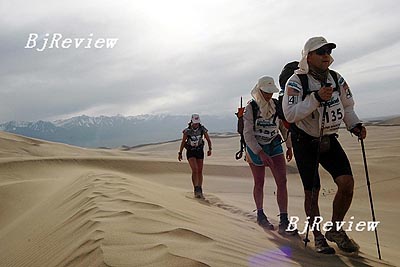|

Evening was fading into night, and after jogging five days across blistering hot dunes treacherous river crossings and mountains, Jim Chow could run no longer. Knees failing, he walked as fast as he could. There was still 30 km to go before he could rest and recharge for another day of running across China's Gobi Desert.
Chow, age 51, from Denver, was one of 172 competitors in a seven-day, six-stage, 250-km footrace across the Gobi held by an organization called RacingThePlanet last June. It was his second desert race-he had run across the Atacama Desert in Chile the year before. On June 12, Chow boarded a plane with his friend and fellow runner Carl Koecher. It took them 40 hours to reach Kashgar, in China's western Xinjiang Uygur Autonomous Region.
The bustling city was not what he had expected in such a remote area. The city's history as a stop on the Old Silk Road was evident by its ancient mosques and markets, but the city was surprisingly modern as well, he said.
"It completely blew me away. I thought it was going to be a dusty, old town with more goats than people," Chow said, adding that most newspaper articles and travel guides he had read had focused on Kashgar's historical districts. "Once we came into town and I saw all these big buildings I was taken aback. We did eventually go to the old town, but I was amazed at how much development was taking place."
After registration, equipment checks and breakfast, Chow and his fellow competitors boarded buses to take them into the Tashkorgan region nine hours away. They would return to Kashgar a week later, after running 250 km over some of the Earth's harshest terrain. However, the first challenge was to find a place to rest for the night, as the heaviest rains to hit the region in more than 50 years had washed away the group's pre-race campsite in flash floods.
The next morning, the runners were treated to a folk dance performance by local Tajiks in traditional costumes. RacingThePlanet donated books and sports equipment to the local school and then the race was on. Stage one took Chow across 36 km of valley roads and through Tajik villages. Though Chow said he had read of local unrest and tension in the region, he was amazed at the desert hospitality and friendliness.
"A lot of people wanted to take pictures with us and a lot of people had their hands outstretched. In a lot of third world countries that I've visited, outstretched hands mean ‘give me something,' but here they just wanted to shake your hand," Chow recalled. "We were totally amazed. It was a real treat."
Stage two took Chow 36 km down the Tiznap and Zerapxen rivers through Tajik settlements. After a steady six hours of running, Chow arrived at a small village where he would spend the night in a Tajik home.
"Ten of us were assigned to one family, and again it was a truly fascinating experience," Chow said. "Our host's little daughter saw a little Doberman toy dog that I ran with, because I train with my dog back home. I decided to give it to her and she was so happy."
"It's those moments that I will never forget. There are all these little instances that reinforce the idea that we're all people no matter where you live and grow up. People are the same everywhere. Going through a place like this really blows away a lot of stereotypes and preconceived notions," he said.
For the third stage of the race, the runners crossed 40 km of mountains and rocky terrain, enduring freezing rain and heavy winds. Normally dry riverbeds had turned into rushing rapids due to the heavy rains. Sometimes, Chow would run with his friends, and other stretches of the race he would complete by himself, navigating the terrain and embracing the isolated nature of the region.
Injury notwithstanding, Chow began the fourth stage in good spirits, but the rain that had chilled the competitors the day before had turned into blistering hot sunshine. The stage required the runners to cross 47 km of valleys and gorges.
On the fifth day of running, the fifth stage, Chow said he began to question the sanity of racing across the Gobi. The stage took Chow across 80 km of 1,500-foot sand dunes and rocky riverbeds that were sometimes full of "foot sucking mud traps." It was then that his knees failed and running became impossible. However, Chow soldiered on. It took Chow nearly 16 hours to complete the stage.
The sixth and final stage was 11 km into the heart of Kashgar. The runners boarded buses that took them to the edge of the city, and the competitors ran through the winding streets and alleys to end in front of the 400-year-old mosque in the heart of the old city. After the long bus ride, Chow said his swollen knees had locked up, making what should have been a relatively easy stage into one of the most difficult parts of his journey. Crossing the finish line, Chow said he felt euphoric.
Chow finished in the 64th place, with a time of 47 hours, 52 minutes and 7 seconds. Of the 172 runners, 157 completed the race. Following the race, Chow visited Beijing, and then traveled to Xiamen to meet some of his relatives for the first time. The trip was Chow's first to China, though his father was born in Xiamen and his maternal grandparents also lived in south China. Chow said he "absolutely" plans to make another trip to China, study Mandarin and reconnect with his heritage.
(Reporting from New York) | 